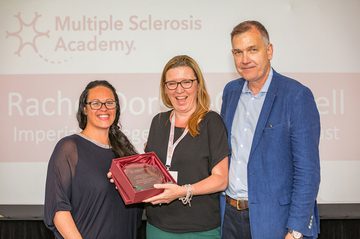Impact of a pharmacy-led prescribing service on the monitoring of natalizumab patients
Rachel Dorsey-Campbell
Senior lead pharmacist, Imperial College Healthcare NHS Trust

Rachel Dorsey-Campbell with Sarah Gillett and Prof Gavin Giovannoni, 2018
MasterClass 3, 2018
Dorsey R, Quinn T, Felongco T, Delacruz D, Walters P, Scalfari A, Singh-Curry V, Malik O, Nicholas R, Imperial College Healthcare NHS Trust
Introduction:
Regular monitoring, with MRI assessments and blood samples, of MS patients on natalizumab exerts a significant burden on specialist centres. We investigated how the introduction of a pharmacy-led prescribing service impacted on the quality of monitoring and on the safety of patients.
Methods: Among patients receiving natalizumab at Imperial College Healthcare Trust (ICHT) MS centre, we evaluated the frequency of consultant reviews and recording of EDSS scores, of JC virus (JCV) status measurements and timeliness of MRI assessments before and after the introduction of a pharmacy-led prescribing and monitoring service.
Results:
At ICHT 331 patients are treated with natalizumab each month; 839 prescription charts were reviewed by a pharmacist, between December 2016 and April 2018. Treatment duration ranged from 1 month to 9 years (mean 4.5 years, 53 doses) and EDSS at last infusion ranged from 1 to 7.5 (mean 3.9). Of the 299 patients reviewed in 2017, the most recent JCV status was negative in 40% (n=120) and positive in 60% (n=178) of patients; 28% (n=83) had low titre (≤ 1.5) and 32% (n=95) had high titre (> 1.5).
The pharmacy led prescribing and monitoring service was introduced in December 2016. Following this, a higher number of patients had EDSS score recorded (74% in 2016 to 86% in 2018; p<0.001) and JCV status assessed (98% in 2016 to 100% in 2018; p=0.13). In addition, we observed a significant reduction of the number of patients, who had an overdue MRI. An MRI was considered overdue if the interval since the last scan was more than 12 months for JCV negative, 6 months for low positive or 3 months for high positive patients.
The number overdue fell from 16% in 2016 to 5% in 2018, p<0.001. In the subgroup with a high JCV titre the number of patients with an overdue MRI fell from 7.6% to 1.8%, (p<0.001) and no patients had an MRI more than 3 months late. This indicated a significant improvement in timeliness of MRI surveillance.
Conclusion:
A pharmacy-led prescribing and monitoring service is feasible, frees up time for the MS clinical team and greatly helps complying with natalizumab monitoring requirements, which overall improves patients safety.
Poster
More MS Academy Medication Projects

Encouraging excellence, developing leaders, inspiring change
MS Academy was established in 2016 and in that time has accomplished a huge amount with exciting feedback demonstrating delegates feel inspired and energised along their personal and service development journeys. The various different levels of specialist MS training we offer are dedicated to case-based learning and practical application of cutting edge research.
